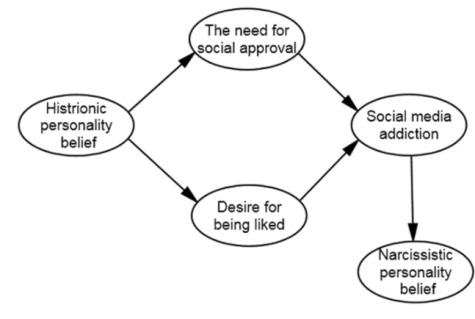How does social media breed narcissism?

Teens on phones
November 19, 2022
Teenagers and children of increasingly younger ages have become progressively reliant on technology, especially social media.
As a consequence, children who use social media often struggle with Narcissistic Personality Disorder. Children with this disorder also frequently struggle with anxiety.
One of the most common effects on children with addictions to social media is the development of self-absorbed, narcissistic mindsets.
Research by the National Library of Medicine shows that people are often attracted to social media that offers self-promotion. This fact alone demonstrates self obsession developing in people.
“This self-promotion offers significant benefits for people: it makes them feel like they look good to others and it makes them feel more positively about themselves”
This study highlights the fact that the more interaction (comments and likes) a post gets, the more narcissistic one’s behavior may become. Similarly, a lack of comments and likes decreases narcissism behavior.
Mentally, this effect is driven by exploitative and entitlement that one can develop from getting high interaction on their social media posts. People rely on others for confidence and are willing to exploit themselves for reassurance from others.
Being narcissistic is being overly confident and without having empathy, which can make one look self-absorbed and rude.
Due to narcissism, social media obsessed teens can have trouble holding relationships and intimacy with partners. A narcissist will bring down the ones around them to bring themselves up, and will not see the partner as a person but rather what they need.

Parents have become aware of this phenomenon as well. Limiting kids’ phone time, limiting what video games they can play, or not allowing their children on social media, are all various ways that parents have begun to try and prevent this issue.
Parents taking action may help children dodge developing this complex or lessen the effects, but what are parents supposed to do if their child begins to reveal this behavior?
When children become addicted to presenting themselves on social media, what can be done? Limiting their phone access will only cause sneaky behavior or rebellion, and putting them in therapy may feel excessive or unnecessary.
Treatment for this behavior is somewhat a gray area. Everyone is different, and there is no one way to handle such social media addiction.
Jennifer Smith, mother of three, explained why she did not allow her children to have social media accounts until they were older.
“Social media is very addictive. I didn’t want them to overshare things in their lives. Everyone doesn’t need to know all your personal business,” said Smith.
Some kids and teens have even seen an overall decline in mental health due to social media. Rather than have their ego boosted, it can be damaged. When seeking validation from others, a narcissist will do whatever it takes, even if it destroys them.
When one does not receive reassurance, it can create mood swings and bad behavior. Narcissists are dependent on others and the reassurances and confidence it gives them.
With the rise of social media, children and teens have become addicted and overly aware of their physique. Praise of their appearance and the false sense of being cared for has become central to a child’s online existence.
The feeling of people caring about their lives over the internet has replaced the need for those feelings in their real life. In the end, these habits and personality defects will carry over into their adult life which will eventually cause trouble in keeping friends, jobs and relationships. Thus, an addiction to social media and the narcissism it creates may have lifelong, lasting effects.












